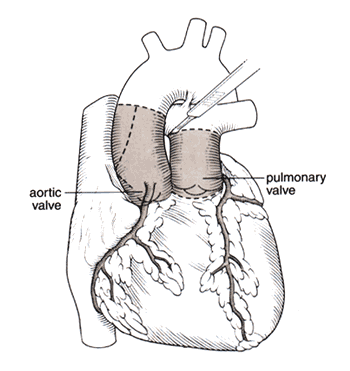Ross Procedure Complications?
By Adam Pick on September 25, 2007
After I was diagnosed with severe stenosis and regurgitation in my bicuspid aortic valve, I was required to make a pretty significant decision.
Since the echocardiograms showed that my aortic valve was beyond heart valve repair, I needed heart valve replacement surgery. (FYI, I had two echocardiograms to confirm my heart valve condition. I highly, highly, highly encourage you do the same. Second opinions are critical.)
That said, I had to answer the question, “What type of heart valve replacement surgery should I have?”

The Ross Procedure – Special Aortic Valve Replacement
In talking with my cardiologists, potential surgeons and my family, I selected the Ross Procedure. It was not an easy decision to make. But, given my active lifestyle and the Ross Procedure statistics, I still think the double valve replacement surgery was the best option for me. I am writing about this today because I just received a question that reads, “Adam… Are there more Ross Procedure complications than other heart valve replacement surgery complications?” To learn more about this Ross Procedure, click here.
To be honest, I do not have any quantitative data to compare Ross Procedure complications against other heart valve replacement surgery complications (e.g. the use of mechanical valves, tissue valves, pig valves, cow valves, etc.).
However, I have heard that the Ross Procedure is a more technically challenging surgery for the cardiac surgeon to perform. You have to remember that in the Ross Procedure both the pulmonary and aortic valves are removed.
You may think that a double valve replacement would directly correlate to double the risk… and double the complications. There may be some truth to that.
However, if you do your diligence and find the right surgeon who is highly skilled and proficient in the Ross Procedure (Vaughn Starnes, William Ryan, Paul Stelzer), the complications may be on par with other heart valve replacement procedures.
What’s most interesting about heart valve surgery complications and Ross Procedure complications is the patient perspective on what constitutes a perceived complication following heart surgery. I recently surveyed 78 former patients to better understand their post-operative experience. As you can read, 66% of patients experienced a “perceived” complication following heart surgery.
That’s pretty high, right?
Maybe, but I stress the fact that these are perceived complications not clinically stated complications.
Well. I hope that answers the question about Ross Procedure complications.
Keep on tickin!
Adam
|
R Jessup says on April 27th, 2012 at 3:19 pm |
|
I had a Ross procedure operation at Stanford 14 years ago and it went quite well with no complications that I could detect after the operation. Follow up from my cardiologist showed a very good result as well, with a very smooth flow of blood through the valve (sorry for the terms, I’m an engineer, not a doctor). I was 47 at the time. I was very active in endurance sports at the time. In the past few years, I’ve had a sharp drop off in endurance and wind, and the only significant change in my heart the cardiologists find is an enlarged right chamber. Could this be a long term effect of the Ross procedure? Has it been noticed with other patients ? |
 |
|
tina keatinge says on October 4th, 2012 at 11:10 am |
|
My Son Had a Ross procedure in December 1994, performed by Professor Freddie Woods of the Mather Hospital in Dublin,My Lad was the first to have a Ross Performed in Ireland,He Recovered very well & did not need to have it Repeated until 2008.He is doing very well with no major Problems . The Same procedure was performed in England in 1995, for the first time . |
 |












